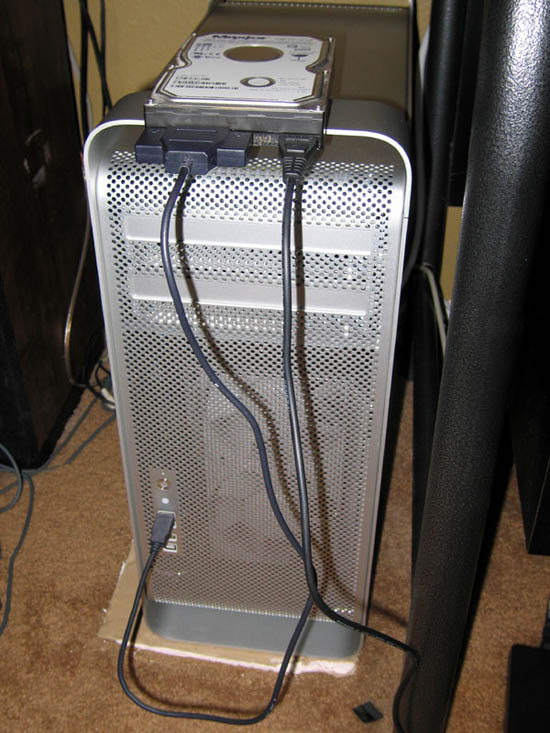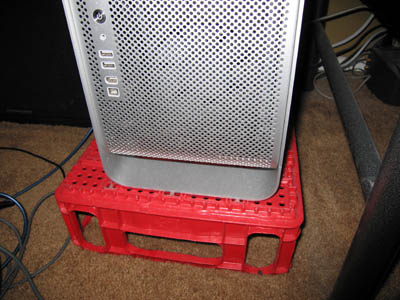|
|
This topic comprises 3 pages: 1 2 3
|
|
Author
|
Topic: Adios, Windows XP
|
Adam Martin
I'm not even gonna point out the irony.

Posts: 3686
From: Dallas, TX
Registered: Nov 2000
|
 posted 06-30-2008 09:35 PM
posted 06-30-2008 09:35 PM




quote:
XP hooked users, but now it gets the hook
Tom Abate, Chronicle Staff Writer
Monday, June 30, 2008
Petitions are a time-honored political tool to save endangered species, preserve open space and agitate for change.
Now Microsoft Corp. finds itself the target of a petition drive to save - get this - a PC operating system.
Today the Redmond, Wash., software giant officially stops selling Windows XP, the program that animates millions of business and consumer PCs.
Microsoft wants to push corporate and consumer buyers toward Windows Vista, its new-and-improved program to do things like display glitzier graphics and keep spyware off the machine.
But many PC users are resisting this forced migration, and a San Francisco technology journalist has gone so far as to post a petition at SaveXP.com that has gathered 210,000 signatures.
"This is classic advocacy: If you think something's wrong, say something about it," said Galen Gruman, executive editor of InfoWorld.com, a trade publication that caters to the professionals who install and maintain corporate computer systems.
Gruman said the petitions are being sent to Microsoft CEO Steve Ballmer, who emerges now from the shadow of the retiring Bill Gates to confront an embarrassing revolt.
For instance, Intel Corp., the chipmaker that has long been Microsoft's partner in dominating the PC industry, says that while it is testing Vista "in some departments," it still uses XP.
"We have not deployed Vista across the enterprise," said Intel spokesman Bill Calder.
While such rebuffs may hurt Microsoft's pride, Vista's unenthusiastic reception is unlikely to put a big dent in its bottom line, especially in the roughly two-thirds of the PC market devoted to corporate computer sales.
Al Gillen, vice president of research for the market research firm IDC, explained that corporate buyers have "downgrade rights" that allow them to load Windows XP onto new PCs instead of Vista - even though they will actually pay for the newer operating system when they buy new hardware.
"For business customers, it's a nonissue," Gillen said.
But for the other 35 percent of the market, including consumers who lack "downgrade rights," the discontent could benefit rivals like Apple's Macintosh operating system and Linux, the populist software developed on the Internet and owned by no one.
"Apple is doing everything right, hammering at Microsoft on a daily basis and doing it brilliantly," said Lance Ulanoff, editor-in-chief of PC Magazine, a publication aimed at average users.
Michael Gartenberg, a PC industry analyst for Jupiter Research, said that by forcing customers to migrate from XP to Vista, Microsoft risks making the same mistake as the Coca-Cola Co. when it temporarily replaced its tried-and-true formula with New Coke in 1985.
"You always want to pull your customers along, you never want to push them," said Gartenberg, adding, "When people realize they're being forced to try something new anyway, a lot of them decide to try Pepsi."
Gillen, the IDC analyst, said that to a certain extent, Microsoft is the victim of its own success. "XP is a pretty good product," he said, and while Vista is arguably better, "a pretty good product can hang on for a while."
In response to its critics, Microsoft has already softened its initial posture regarding the switchover. Microsoft has said ultramobile PCs - like the new $500 laptops from Hewlett-Packard and the Taiwanese firm Asus - can be sold with XP.
Microsoft also has promised to provide extended customer support and fix bugs for Windows XP until 2014.
But the petition signatures being sent to Redmond seem unlikely to win a broader reprieve.
"We're aware of the campaign but continue to be guided by what we hear from customers and partners," Microsoft said in a statement. "And what we're hearing in the full range of feedback we're receiving is that the transition plan we've outlined makes sense."
But Gruman, the tech editor from San Francisco, said while there's not much precedent for Microsoft admitting wrong, the company has reversed itself under similar circumstances so as to make things right.
Gruman recalled that, in 2000, Microsoft pushed a similar upgrade from its Windows 98 operating system to Windows Millennium, a successor that lived just long enough to be named one of the 25 worst technology products of all time by PC World magazine.
After officially killing Windows 98, but before it was able to launch Windows XP, Microsoft released Windows 98 Second Edition. So long as customers want XP, and Microsoft can make money selling it, Gruman asks why not.
But Ulanoff, of PC Magazine, says that if Microsoft has erred, it is being too permissive because it will have to support XP and Vista while developing its next operating system, Windows 7.
"What Microsoft tries to do with its OS is to support the world," he said.
| IP: Logged
|
|
|
|
|
|
|
|
Bobby Henderson
"Ask me about Trajan."

Posts: 10973
From: Lawton, OK, USA
Registered: Apr 2001
|
 posted 07-01-2008 12:08 AM
posted 07-01-2008 12:08 AM




Windows 7 is supposed to have a different touch screen based interface. While the concept seems very neat, I'm sort of turned off by the idea as well. Just imagine your computer screen all smeared up with a bunch of damned finger prints. Yeah. It's a pet peeve of mine when a coworker wants to point out some element of artwork on one of my CRT monitors and insists on smearing his fingertip on the screen. Just point at it! Don't touch! Arrgh.
Microsoft is in a pretty difficult position with trying to market Vista or any other new version of Windows.
Microsoft has already been selling XP for far longer than anyone should ever have expected. I could be wrong, but it appears to me like XP has had a longer run than any previous version of Windows. A new version of Windows has been long overdue.
The trouble with Vista is it "broke" more things than it fixed. It didn't offer a sensible upgrade path since it didn't support the drivers of many peripherals and even had issues with lots of legacy XP-compatible software. My workplace has some expensive hardware (some of it brand new) that just isn't compatible with Vista because no drivers have been written for it yet. Until that happens, we're staying with XP -even if that means avoiding new computer purchases.
At the same time, the problems associated with Vista are really nothing new. Every previous version of Windows has had problems in providing backward compatibility to older software and connected devices. Vista has only gained a lot more negative publicity over the situation.
Apple has been having fun teeing off on Microsoft on the Vista deal, but Apple has never had to deal with the sort of legacy software/hardware support issues Microsoft has had to deal with over the years. Apple makes all the hardware, the OS and even a lot of the software. So they tightly control much of the platform. And when they want to release a new OS the backward compatibility issue just isn't important at all. They'll just have you dual boot two versions of MacOS for awhile until every app you own has a version compatible with the new OS. Luckily for Apple, its user base is largely made up of enthusiasts for the Mac platform and often view Apple products as a sort of fashion item. So it's not difficult to get those users to fork over lots of money on hardware and software. The much larger base of Windows users is widely varied in its attitudes -with stodgy, penny pinching businesses being a major component of it.
Microsoft is making a mistake by pulling the plug on Vista. They're screwing home users and small business users by removing XP as an option. If they want to stick Vista on every Windows-based PC, they ought to at least let users be able to dual boot a copy of XP as well. The issues with device drivers and certain kinds of software for Vista has not been completely solved.
| IP: Logged
|
|
|
|
|
|
|
|
|
|
|
|
|
|
|
|
|
|
|
|
Leo Enticknap
Film God

Posts: 7474
From: Loma Linda, CA
Registered: Jul 2000
|
 posted 07-01-2008 04:08 AM
posted 07-01-2008 04:08 AM





quote: Bobby Henderson
If they want to stick Vista on every Windows-based PC, they ought to at least let users be able to dual boot a copy of XP as well.
Which is precisely what I do - I have Vista Ultimate x64, XP Pro x86 (for backwards compatibility) and Ubuntu x64 on three partitions on both my desktop and laptop. However, setting that up was not simple or straightforward - if you're not comfortable partitioning hard drives, editing the bootloader, installing device drivers etc., you're not going to be able to do that. Added to which is the fact that I can buy copies of Windows at a massive discount through the university at which I work - most people don't have that option, and for them buying two licences isn't going to be cheap, either. In other words, unless you're a bit of computer geek who is prepared to spend quite a bit of money, you're not going to be able to do this.
Agreed entirely that if MS had any sense they'd actively encourage (through competitive pricing) PC manufacturers to develop dual boot images and sell computers with a Vista/XP dual boot setup. After all XP must have more than recouped its research and development costs by now, so any further copies they sell must represent more-or-less pure profit (minus a small level of ongoing support costs).
| IP: Logged
|
|
|
|
All times are Central (GMT -6:00)
|
This topic comprises 3 pages: 1 2 3
|
Powered by Infopop Corporation
UBB.classicTM
6.3.1.2
The Film-Tech Forums are designed for various members related to the cinema industry to express their opinions, viewpoints and testimonials on various products, services and events based upon speculation, personal knowledge and factual information through use, therefore all views represented here allow no liability upon the publishers of this web site and the owners of said views assume no liability for any ill will resulting from these postings. The posts made here are for educational as well as entertainment purposes and as such anyone viewing this portion of the website must accept these views as statements of the author of that opinion
and agrees to release the authors from any and all liability.
|

 Home
Home
 Products
Products
 Store
Store
 Forum
Forum
 Warehouse
Warehouse
 Contact Us
Contact Us




 Printer-friendly view of this topic
Printer-friendly view of this topic












![[Roll Eyes]](rolleyes.gif)


![[thumbsup]](graemlins/thumbsup.gif)
![[thumbsdown]](graemlins/thumbsdown.gif)

![[beer]](graemlins/beer.gif)





